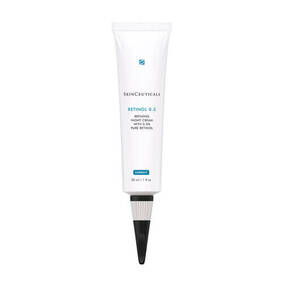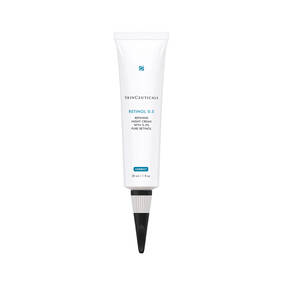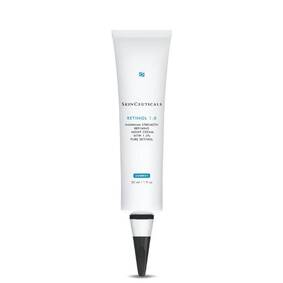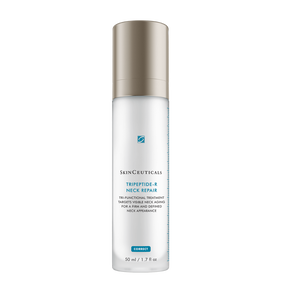Article Overview
- The primary difference between retinol and retinoids is their potency and the speed at which they deliver results; retinol is milder and works gradually, while retinoids are more potent and provide quicker outcomes.
- SkinCeuticals offers a range of retinol products tailored to different skin needs: Retinol 0.3 is ideal for beginners, providing gentle care for fine lines and texture, while Retinol 0.5 offers a moderate strength for improving radiance and skin texture.
- For more advanced retinol treatment, Retinol 1.0 is recommended, which offers a higher concentration for enhanced skin renewal and significant reduction in the appearance of wrinkles.
- Additionally, Tripeptide-R Neck Repair combines 0.2% retinol with tripeptides to target the delicate neck area, improving elasticity, firmness, and overall texture.
Retinol and retinoids are two powerful ingredients commonly used in skincare products to address signs of aging and improve the skin's overall health. While they share similar properties and are both derived from vitamin A, there are important distinctions between the two that determine how they are used in skincare. Understanding these differences is crucial for choosing the right product and incorporating it effectively into your skincare routine.
What is Retinol?
Retinol is a mild, over-the-counter retinoid that helps improve the skin's texture, tone, and overall appearance. Retinol is often recommended as a starting point for those who are new to using retinoids, as it is generally well-tolerated and less likely to cause irritation compared to other forms of retinoids.
What are Retinoids?
Retinoids encompass a group of compounds derived from vitamin A, including retinol, tretinoin, adapalene, and tazarotene. They are more potent than retinol and require a prescription from a healthcare professional. Retinoids are highly effective in treating a wide range of skin concerns, including wrinkles, fine lines, acne, and pigmentation issues. However, due to their potency, they can also cause more significant side effects, such as dryness, redness, and peeling, especially when first introduced into a skincare routine.
How are Retinol and Retinoids Different?
The primary difference between retinol and retinoids lies in their potency and the results they deliver. Retinol is a gentler, over-the-counter option that works gradually to improve the skin's texture and appearance. It converts to retinoic acid, the active form of vitamin A, within the skin, but this process is slower compared to prescription retinoids. As a result, retinol is less likely to cause irritation.
On the other hand, prescription retinoids are more potent and deliver faster results. They are directly converted to retinoic acid upon application, leading to more rapid improvements in skin texture, pigmentation, and other concerns. However, due to their potency, retinoids require careful use and monitoring by a dermatologist or skincare professional to manage potential side effects.
Can Every Skin Type Use Retinoids?
While retinol and retinoids are generally well-tolerated by most skin types, some individuals may experience side effects, especially when using prescription retinoids. These side effects can include dryness, redness, peeling, and increased sun sensitivity. It is advisable to start with a low concentration of retinol or retinoid and gradually increase usage as the skin becomes accustomed to the product. Additionally, it is crucial to use sunscreen daily, especially when using retinoids, as they can make the skin more sensitive to the sun.
How are Retinoids and Retinol Used in Skincare?
Both retinol and retinoids are typically applied to the skin at night as part of a skincare routine. Here are some tips for incorporating them effectively:
- Nighttime application: Retinol and retinoids should be applied at night since they can make the skin more sensitive to sunlight. Use them after cleansing and toning, but before applying moisturizer.
- Applying retinol slowly, increasing frequency over time: When starting with retinol or retinoids, it is advisable to use them 2-3 times per week and gradually increase frequency as the skin becomes more accustomed to the product. This helps minimize the risk of irritation.
SkinCeuticals Product Formulated with Retinol
SkinCeuticals offers a range of skincare products formulated with retinol to address various skin concerns:

Retinol 0.3
A gentle retinol eye cream that helps diminish the appearance of fine lines, wrinkles, and under-eye circles, while improving overall skin texture.

Retinol 0.5
This gentle, yet effective retinol serum is ideal for those new to using retinol. It helps improve skin texture and radiance while minimizing the appearance of fine lines and wrinkles.

Retinol 1.0
For those looking for more advanced retinol treatment, Retinol 1.0 offers a higher concentration of retinol to enhance skin renewal and reduce the appearance of fine lines and wrinkles.

Tripeptide-R Neck Repair
Tripeptide-R Neck Repair: This luxurious neck cream combines 0.2% retinol with tripeptides to improve skin elasticity, firmness, and texture in the delicate neck area.
To discover the best retinol product for your unique skin concerns, use our online Routine Finder, or schedule an appointment with a SkinCeuticals Skincare Professional for a one-on-one consultation.
Next: A Guide for How Much and How Often to Use Retinol
Shop Featured Products
About Gretchen Wobensmith
Gretchen Wobensmith is a licensed aesthetician with 27 years of experience. She has been training professionally for large global brands for the last 20 years. Gretchen brings her skill set of having a deep understanding of skin histology and ingredient technology to the SkinCeuticals Global Education Team as their Product Lead. Gretchen shares her passion for mentoring skin care professionals, to elevate their knowledge and skill set in the medical skin care industry.





/Correct_Retinol0.5_30ml_INTL.jpg?sw=166&sh=166&sm=cut&sfrm=jpg&q=70)
/22_0429_SKC_PDP22_COR_RET_0.5_INTL_TEXTURE_2400x2400.jpg?sw=270&sm=fit&sfrm=jpg&q=70)








